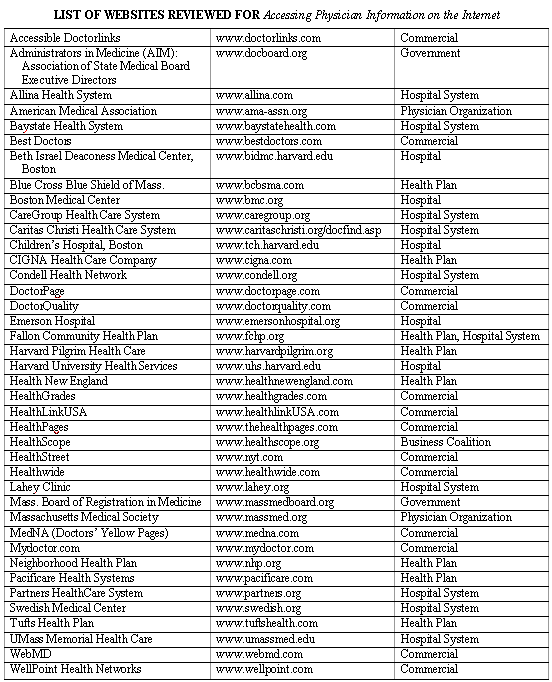Consumers who are increasingly turning to the Internet to search for information to help them choose a physician are likely to find significant gaps in the accuracy and completeness of the information available to them, according to a new report from The Commonwealth Fund. Researchers at the Massachusetts Health Data Consortium, who conducted the study with support from the Fund, found many instances where websites had incomplete, missing, and possibly inaccurate or outdated data, and some sites which included only a limited number of physicians in their databases. The researchers also found that information is often poorly organized and not searchable, and sites often lack disclosures about how information is gathered or whether fees are paid to be included in the database. The authors conclude that health care accrediting organizations, health plans, hospitals, and local and national industry organizations and associations should make efforts to improve the information on the Internet, saying that it has the potential of being a valuable tool for consumers. "Previous studies have shown that having a choice of physician increases patient satisfaction with health care. However, without information there is no real choice," said Stephen Schoenbaum, M.D., senior vice president of The Commonwealth Fund and a co-author of the report, Accessing Physician Information on the Internet. "Improving the quality and content of information on the Internet about physicians and physician performance can be an important way to help consumers make informed choices about their health care." The study analyzed 40 websites that offer information about physicians. The sites included commercial sites, hospital sites, government sites, and sites sponsored by health plans. The sites include basic information on the doctors in their database such as medical school attended, years in practice, medical insurance accepted, specialties, and logistical information such as office location and hours. Some sites also offer ratings on outcomes measures such as deaths or complications, and patients' evaluations of physicians' listening and communication skills. No sites included all of the information. The authors recommend that all physician directory websites include the following standard information in addition to a minimum data set of information on individual doctors:
- Disclosure statements about sources of data and any fees required from physicians to be included
- Date the information was last updated or verified
- Statement about the limitations of physician performance data
- Size of the database and the percentage of the active physician population it comprises
- Explanation for why data fields may be empty
- Description of the recommendation process and
- Data on the number of participants in patient satisfaction or experience surveys and how information was obtained from them



